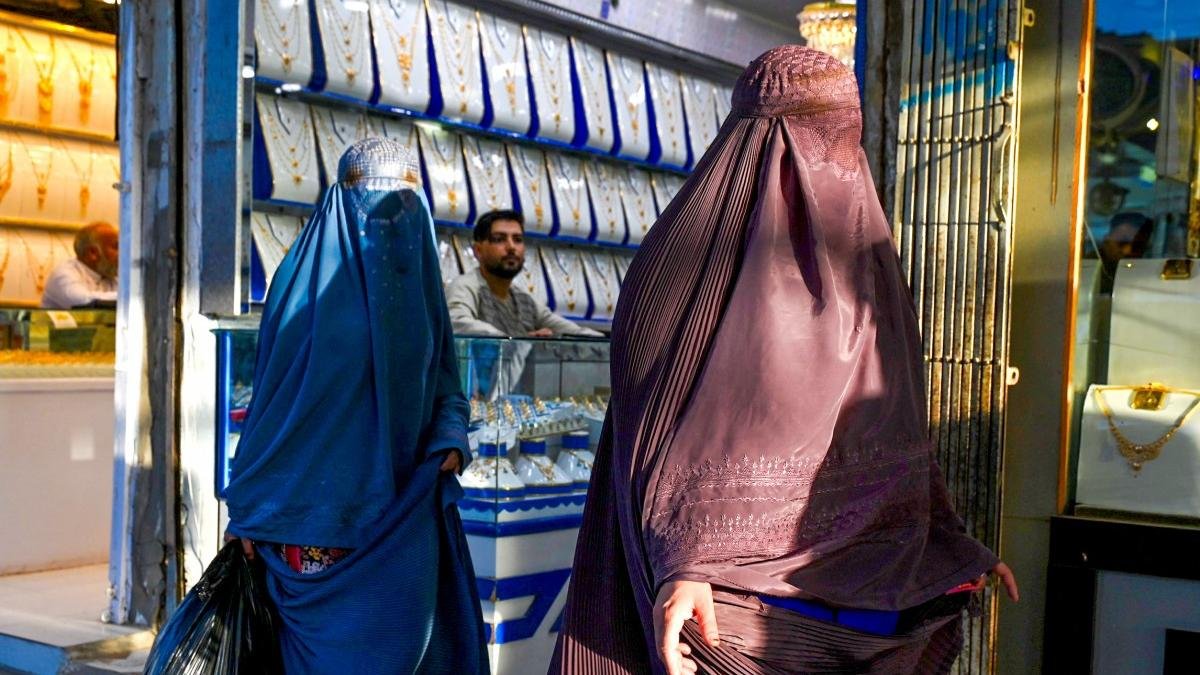'A slow death': The traumatic lives of women under Taliban oppression in Afghanistan
Laila Basim and Fatima tell what life is like under the brutal repression of the savage Islamic fundamentalist regime after the chaotic U.S. withdrawal in 2021. The Taliban's crimes, however, seem not to be a priority for the international community.

Two burqa-covered Afghan women in a Kandahar market
Afghan activist Laila Basim (30) recently wrote an article in Spanish newspaper El País, describing the hard lives of women in Afghanistan since the Taliban regained power there.
Basim, who today resides in the United States with her husband and three children, described life under the Taliban government's laws in the country as "a slow death." In fact, she explained that she and other women lost their jobs due to the tight restrictions imposed by the radical Islamists currently ruling Afghanistan.
The young woman said she was fired from the Ministry of Economy after the Taliban took power in the country. She was then forced to stay confined to her home without the possibility of fulfilling her dreams.
Basim explained that the Taliban have banned women over the age of 12 from attending schools and universities, have been expelled from their positions in the state, and are not allowed to travel more than 70 kilometers (44 miles) without the company of a man or without having a husband, among other repressive measures.
In her article, Basim noted that due to the sheer number of atrocities she has witnessed, she cannot mention them all. However, she highlighted some of the horrific scenes she witnessed and suffered firsthand.
The young author claimed that she had a miscarriage due to a beating by Taliban forces during a protest in 2022, saw her neighbor, a young girl, killed by her brother for refusing to submit to a forced marriage, witnessed a two women stoned to death because they were not wearing a hijab, and a shooting execution of clerics branded as infidels, among other atrocities. In addition, she said that on repeated occasions, she saw young women killed in the street.
Basim did not hide her disappointment with the media, as she indicated that these incidents are not usually covered by the international press.
Basim has protested as part of the Afghan Women's Movement in Kabul to call for an end to oppression against women but could not continue to do so due to the risk it posed to her life. In fact, on one occasion, when she arrived at a square where she had called for a demonstration, a Taliban agent demanded that she cancel the rally, otherwise they would take her and other demonstrators away so that "no one would ever hear from us again." She also recounted how members of the Taliban intelligence entered her house and searched it twice in one day, for which reason she had to move regularly and in some cases was even forced to take refuge in Badakhshan, her home province.
Basim also claimed that she had to close the Zan library, which she and other activists founded to promote reading and culture among Afghan women, due to harassment by the Taliban.
Basim maintained that living in Afghanistan is like suffering "a slow death." She concluded that even so, she is not afraid to put her name on this article condemning the Taliban regime. "I have been beaten, persecuted and insulted, but I will continue to protest," she said.
The odyssey of escaping Afghanistan
Fatima, a young Afghan woman who managed to escape Taliban oppression to Pakistan, told CNN what it was like to flee her country.
The young woman, who is in her 20s and whose name has been changed like the rest of the refugees in her situation for security reasons, was only able to leave Afghanistan on her third attempt.
The young woman noted that she was serving as an Afghan Army officer when Kabul fell in August 2021.
Like so many of her compatriots, Fatima could not leave the country immediately after the chaotic withdrawal by U.S. forces, so she decided to head to Iran along with a group of others.
Fatima and her companions undertook a tough and long trek on foot from a city in northern Afghanistan that lasted three days. However, their efforts were unsuccessful, as they were spotted by Iranian forces stationed at the border, who opened fire on them, so they were forced to flee.
A month after that ordeal, Fatima traveled to Iran on a visa she obtained after paying some $640 to a middleman. Months later, smugglers told her they could take her to Turkey but ultimately held her against her will, beating her regularly and demanding money from her relatives to release her.
Days later, Iranian Police found her and other migrants, transferred them to a detention center, and then took her back to Afghanistan, where the Taliban took her off the bus she was traveling on and interrogated her under threat of torture to get her to talk about her role in the military.
Fatima recounted that her family was able to free her after borrowing $3,000 and bribing the Taliban.
Fatima's sister Azra also spoke to CNN and recounted that the young woman returned home "covered in blood."
Fatima further maintained that she cannot remember everything that happened to her in Iran because the severe beatings she suffered impaired her memory.
The third time Fatima attempted to flee was in early 2023, when a smuggler helped her cross into Pakistan, this time successfully.
Record number of female Afghan refugees
CNN noted that over the past 40 years, millions of Afghans, predominantly men and boys, have fled their country in search of safety and economic opportunity.
Refugee destinations typically include Pakistan and Iran, but also the United States, Turkey, Australia and western Europe, among other places.
However, since the Taliban seized power, the number of female Afghan refugees has increased. According to data from the U.N. Refugee Agency (UNHCR), the number of women fleeing Afghanistan more than doubled per year.
In 2023 there were more than 3.1 million female Afghan refugees, while in 2021 there were approximately 1.2 million, and in 2020 the number hovered around 800,000.
There are now more female Afghan refugees than at any time in the last 20 years.
The Taliban's war on women has intensified
British newspaper The Guardian claimed that the Taliban's war against girls and women has escalated.
The regime has already assassinated women lawyers, activists, students, police, etc., in addition to subjecting them to torture and all kinds of abuse.
Concerns also persist that the Taliban will resume public stonings. However, the newspaper stressed, there is another way of killing women and their children: taking away their livelihood.
The Guardian argued that if women are forced to submit to abusive men, with no possibility of escape, they will be killed, and if access to medical care is reduced, they may die from preventable causes.
Women understand that in such a restrictive context, there is no way to get ahead. However, it is not only adult and young Afghan women and girls who suffer, but also men and boys, who lose a share of household income or must mourn the deaths of their wives and mothers. In fact, some Afghans are punished by the Taliban for refusing to mistreat their wives.
The international community looks the other way
In a report published last May, Richard Bennett, U.N. special rapporteur on human rights in Afghanistan, called for gender apartheid to be criminalized under international law.
However, it seems that the international community has not made this issue a priority, so The Guardian called for Afghan women to be heard in order for the torment they suffer under the Taliban to end as soon as possible.

























